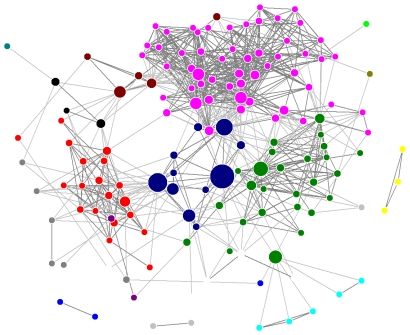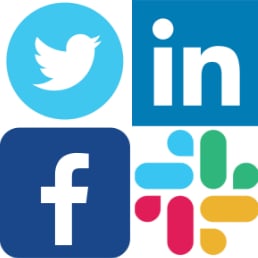...
How would you like to be a Guest Blogger for KMI? Email us at: info@kminstitute.org and let us know your topic(s)!
KM Gets Personal

by Guest Blogger, Tatiana Baquero - Principal Consultant with Project Performance Company
Last year, I did a presentation about Personal Knowledge Management (PKM) to MET (Mujer, Empresa y Tecnologia, in Spanish – Women Enterprise and Tecnology, in English), a network of professional women in Washington, DC. People were thrilled with the topic. While some had never heard about knowledge management, others had heard about it only in the context of business and technology, and were wondering how it could be applied at the personal level.
So, what is PKM?
PKM involves using processes or tools to gather, classify, store, search, retrieve, and share knowledge for your personal interests. You can use PKM to help you find and explore your passion, balance your life, set goals, explore new ideas, plan your personal growth, learn something new, solve problems, and in general to increase your creativity.
There are multiple PKM processes and tools available in many different flavors to help you think through the questions you’ll find in this blog post. And maybe you are using some of them already without knowing that they are PKM tools. Personal content management apps, social bookmarking, blogs and RSS feeds, wikis, story-telling techniques, mind maps, concept maps, network maps, and networking tools are all examples of PKM tools.
But before moving into the technology aspects of PKM, let’s understand what PKM involves.
For example, what information do you like learning about? Have you identified new topics you would like to learn during 2013? Which courses, articles or books have you enjoyed recently?
It is important to understand how and when you like to learn. Managing learning at a personal level helps you be alert and curious, and keeps your mind active and young. It gives you a sense of accomplishment and pride, and increases your self-esteem. Maybe you like reading literature in paper books before going to bed, or maybe you prefer reading interesting environmental articles online every morning before starting your work day. Try to make some time to think about what information is important for you and how you go about finding it. Keep this in mind as we go through the next few questions.
How do you categorize documents and personal files? When your spouse asks you to find the tax return from 2005, can you easily find it?
I have been developing business taxonomies at PPC for a few years and, of course, I developed a taxonomy for my personal use. At home, all my documents in paper and electronic format are classified in the following categories: Car, Education, Finance, Fun, Health, Housing, Trips, and Work. It saves me a lot of time when I have to look for paid bills, pictures from a trip, or even transcripts from the university.
What personal activities do you choose to focus on? What makes you happy? What would you like to do that you haven’t done yet? Movies, concerts, trips?
When you start doing a fun activity on a regular basis, you will value time more and use it more efficiently. So, why not take the time to identify the activities that make you happy and make some time in your busy schedule to do them.
What people do you choose to spend your free time with? Who brings value to your life and helps you grow as a better person? I am sure that you have a good idea about your professional network, but have you thought about what your personal network looks like?
Make an effort to really know your network of people and identify who you like to share knowledge with, and also who might be able to share knowledge with you to help you grow and achieve your goals at any personal level: family, health, spiritual, emotional, educational or professional.
As I mentioned earlier, there are multiple PKM processes and tools available to help you think through the questions above. My favorites are Personal Content Management Tools, Mind Maps and Networking Maps. Personal Content Management Tools allow you to capture ideas and things you like, hear, and see and access them anywhere at any time using an online tool. Evernote (www.evernote.com) is a good example. Evernote is designed for notetaking and archiving, it lets you save webpages, capture inspiration, and share your ideas with other friends and colleagues.
Mind Maps are spidergraphs used to represent ideas that are linked to and arranged around a central key word or idea. They are used to visualize, structure, and classify ideas, and as an aid to studying and organizing information, solving problems, and making decisions. I love mind maps because they encourage creative thinking for making decisions and planning activities. For some reason, I have always preferred to do them in paper. Below is an example of a mind map. However, there are online tools out there, such as The Brain (www.thebrain.com) that help you build your own mind maps.

Networking Maps help you visually map your personal or business network relationships to increase your success. They help you think how well you are doing at inter-relationships within the various networks you engage with. Nowadays, with social networking sites like Facebook and LinkedIn, we can easily lose perspective of the real circle of people that we interact with and value. Do you really talk to those 500 people you are “friends” with in Facebook? Probably not. Focus on those 30-40 people that you know and care about, and also on those who you would like to know because they would help you grow as a better person and achieve your goals. Value Networks (www.valuenetworks.com) is an example of a tool that helps you visualize your own network of people.

Take some time this year to develop a plan to identify and manage your personal knowledge. Review it and improve it often. Put it in practice. Soon you will notice how you make a better use of your time and focus more on the information, people and activities that make you happy and help you grow.
For more PKM tools, read Tatiana's full blog on PPC's website here . . .










